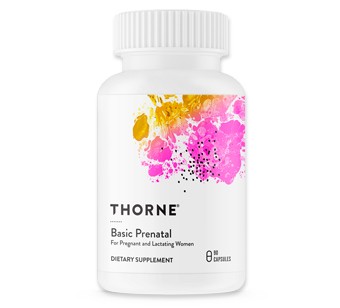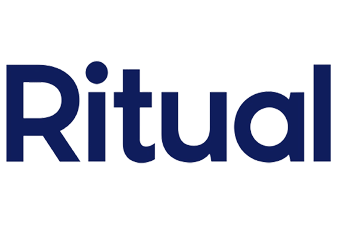WellnessVerge is reader-supported. We may earn a commission when you make a purchase through the links on this page. Learn more about our process here.
The 7 Best Prenatal Vitamins of 2023, Selected by a Dietitian
Last Updated on December 26, 2022
Medically Reviewed by Anthony Dugarte, MD
There is no shortage of prenatal vitamins to choose from. Choosing the right one for you will ensure that you and your baby are getting the best nutrition possible.


During pregnancy, from morning sickness to food aversions, strong cravings to heartburn, it’s no wonder you can’t always get all of your nutrients through diet alone.
Growing a baby takes time and a host of essential vitamins and minerals.
Your body has an increased need for specific nutrients, such as folic acid, iron, calcium, vitamins A and C, the B vitamins, and DHA (an omega-3 fatty acid).
Prenatal vitamins are multivitamin supplements designed to provide you with crucial nutrients needed when trying to conceive, during your pregnancy, and after your pregnancy.
Prenatal vitamins can come in various forms. Most are capsules or pills, but you’ll also see gummies and even liquid prenatal vitamins on the market.
Additionally, they can be a prescription or can be found at many retailers as over-the-counter.
A prenatal vitamin won’t replace a healthy, well-balanced diet. However, it can ensure that you and your baby receive optimal nutrition for healthy growth and development.
We evaluated some of the prenatal vitamins currently on the market and put together a list of our top picks.
Summary of Our Picks
- Best overall: Thorne Basic Prenatal
- Best overall runner-up: One A Day Women’s Prenatal 1 with Folic Acid, DHA & Iron
- Best subscription: Ritual Essential for Women Prenatal Multivitamin
- Best gummy: SmartyPants Organics Prenatal Formula
- Best with DHA: Nordic Naturals Prenatal DHA
- Best organic: Garden of Life Mykind Organics Prenatal Once Daily Tablets
- Best budget pick: Nature Made Prenatal Folic Acid + DHA
How We Chose These Brands
To narrow down our choices for the best prenatal vitamins, we evaluated each brand based on the following factors:
- Brand Reputation: Does the brand have a good reputation in the industry? Are the products made in a certified Good Manufacturing Practices facility?
- Professional Involvement: Are there healthcare professionals involved in the formulary process?
- Supported by Research: Is the brand committed to research?
- Price: Is the product budget-friendly and comparable to similar products concerning pricing?
Why Should Pregnant Women Take a Prenatal Vitamin?
Prenatal Vitamins Can Reduce the Risk of Birth Defects
Prenatal vitamins contain an array of vital nutrients to help support the development of your baby.
Many studies have found that getting adequate amounts of folic acid before conception and early pregnancy can reduce the risk of neural tube defects, in addition to congenital heart defects in your developing baby. (1)
Prenatal Vitamins are a Great “Dietary Insurance Plan”
While many of the nutrients you need will come from your food, eating a perfectly well-balanced diet during your pregnancy can be a struggle.
Prenatal vitamins will fill in the gaps or provide a nutrition safety net to ensure you and your baby get the essential vitamins and minerals for optimal growth and development.
Prenatal Vitamins May Provide Relief From Nausea
While some prenatal vitamins can make nausea worse, some are formulated to help ease morning sickness.
Vitamin B6 has been shown to help ease nausea, so if you’re struggling with nausea, ask your healthcare provider about taking a supplement with more vitamin B6. (2)
Best Overall: Thorne Basic Prenatal
Pros
- Contains all essential nutrients and increased folic acid
- Budget-friendly
- Third-party tested
Cons
- May need an additional DHA supplement
- Not vegan-friendly
- Large pill size can make swallowing difficult
Our Take
Thorne Basic Prenatal is an excellent choice option with high levels of folic acid. The product is third-party tested and is offered at a great price point. Speak to your doctor to see if you need more DHA in addition to taking this supplement.
Thorne Basic Prenatal is a high-quality prenatal vitamin that provides the nutrients you need at a great price point.
In addition to other essential nutrients, Thorne’s Basic Prenatal provides a highly absorbable form of folic acid.
While many foods may be enriched with folic acid, supplementation of this vital nutrient is recommended for women as the need becomes much higher during pregnancy.
It is recommended that women consume 600 micrograms of supplemental folic acid, in addition to the folic acid found in food.
Thorne’s Basic prenatal contains 1,000 micrograms of highly absorbable folic acid.
It also contains a high number of vitamin D, calcium, and an array of B vitamins.
Thorne’s products are third-party tested to ensure the purity of each ingredient listed on their product labels.
Price: $29 for a 30-day supply ($0.96 per day) on Amazon.
Best Overall Runner-Up: One a Day Women’s Prenatal 1 with Folic Acid, DHA & Iron
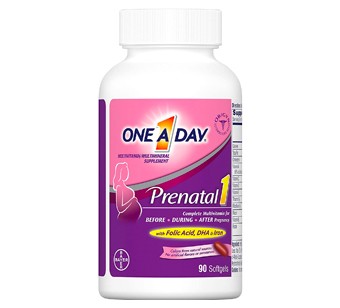
Pros
- Contains all essential nutrients
- Budget-friendly
- Gluten and dairy-free
Cons
- Not third-party tested
- Contains GMO’s
- Large pill size can make swallowing difficult
Our Take
One a Day Women’s Prenatal 1 with Folic Acid, DHA & Iron can be found in most stores and provides all the essential nutrients with some extras for you and your baby.
If you’re in good general health and want a prenatal vitamin easily found in many retailers, that is not too expensive and will cover your nutritional bases, look no further than One a Day Women’s Prenatal 1 with Folic Acid, DHA & Iron.
This brand contains all the essential nutrients, including iron, vitamin D, and folic acid. It also provides a few crucial extras, like DHA and vitamin B6.
Price: $40.49 for a 90-day supply ($0.45 per day) on Amazon.
Best Subscription: Ritual Essential for Women Prenatal Multivitamin
Pros
- Contains all essential nutrients with extras
- Free of allergens
- Third-party tested
Cons
- More expensive than most OTC options
- Contains some extras that aren’t necessarily needed
- Need to remember to cancel the subscription service
Our Take
Ritual prenatal vitamins provide all of the key ingredients you’ll need to support you and your baby. This science-backed subscription multivitamin service is a little pricier than some other supplements, but it’s convenient and third-party tested.
Ritual is fairly new to the scene, but the company makes a great quality product that provides all of the essentials with some additions.
Their formula provides folic acid and choline, omega-3 DHA, and a host of other vitamins, including vitamin B12 and vitamin D.
The product is third-party tested and backed by a full scientific advisory board, including doctors, nutritionists, and research scientists.
Ritual vitamins are also vegan and free from gluten, GMO, and allergens. They do not contain artificial colors or synthetic fillers.
Price: $39 for a 30-day supply ($1.30 per day).
Best Gummy: SmartyPants Organics Prenatal Formula
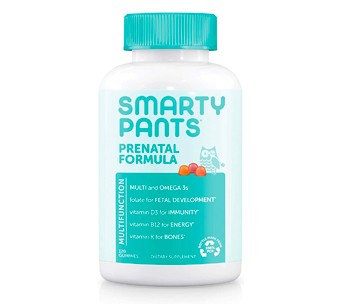
Pros
- Contains all essential nutrients with extras like choline and omega-3’s
- Free of allergens and artificial sweeteners and colors
- Third-party tested
Cons
- Does not contain iron
- High in sugar
- Must take 6 throughout the day, may be difficult to remember
Our Take
SmartyPants prenatal gummies are loaded with essential nutrients and provide choline, omega-3s, and probiotics. For women that may not require additional iron, this high-quality third-party tested product is a great choice.
If swallowing a big prenatal vitamin isn’t an enticing option right now, chewing a gummy may be just what you need.
Thankfully, SmartyPants includes all of the essential nutrition for you and your baby and contains other nutrients like choline, omega-3s, and even probiotics.
The product is free of artificial sweeteners, artificial colors, high fructose corn syrup, and allergens.
SmartyPants does not use synthetic colors or artificial flavors in their gummies, and each batch is third-party tested for purity.
It is important to note that this product does not contain iron. Therefore, it is important to talk with your healthcare professional to see if you require an additional iron supplement.
One serving of SmartyPants contains 7 grams of added sugar, which may be an issue for women instructed to limit their sugar intake during pregnancy.
Price: $25.52 for a 30-day supply ($0.85 per day) on Amazon.
Best DHA Supplement: Nordic Naturals Prenatal DHA
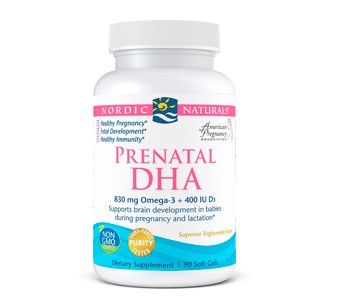
Pros
- Contains high amounts of omega-3’s
- Provides vitamin D
- Third-party tested
Cons
- Does not provide other essential nutrients for pregnancy
- Not intended for vegetarians or vegans
- Expensive for a DHA supplement
Our Take
Nordic Naturals Prenatal DHA is loaded with omega-3s to support your baby’s brain development. As a stand-alone DHA supplement, Nordic Naturals provides a high-quality product.
It is important to remember that this is a DHA supplement and is not intended to replace your prenatal vitamin, which will provide other essential nutrients.
This prenatal vitamin is loaded with DHA, an essential nutrient for your baby’s healthy brain development.
Nordic Naturals Prenatal DHA provides 480 milligrams of DHA and 205 milligrams of EPA per serving.
DHA, along with EPA, are both important sources of omega-3 fatty acids. The product also provides 400 IU of vitamin D.
The product is free of environmental toxins, including heavy metals, and is third-party tested for purity.
It’s important to note that this formula does not provide all the essential nutrients needed to support you and your baby. It is simply an excellent DHA supplement to take if your prenatal vitamin is lacking in DHA.
Price: $24.61 for a 45-day supply ($0.55 per day) on Amazon.
Best Organic: Garden of Life Mykind Organics Prenatal Once Daily Tablets
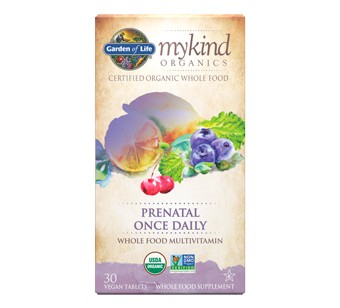
Pros
- Provides essential nutrients and extras
- Organic and vegan
- Small, easy-to-swallow pill
Cons
- Lacking in DHA
- Suggested dose is 3 times a day
- On the pricier side
Our Take
Garden of Life Mykind Organics is a high-quality brand that provides essential nutrition for women through their pregnancy journey.
It’s a bit pricier than other prenatal supplements, but it’s organic and may even help to relieve nausea and other digestive issues.
If taking this supplement, be sure to talk with your healthcare provider about the possible need to take an additional DHA supplement.
Mykind Organics Prenatal Multivitamin is a comprehensive whole-food multivitamin designed to support women from pre-conception through lactation.
Besides providing you with high-quality nutrition from 21 essential nutrients, the product also provides probiotics.
Feeling queasy? This organic supplement also contains organic ginger and lemon peel to help reduce nausea to settle your system.
Mykind Organics Prenatal Multivitamin is third-party tested and farmed without toxic pesticides, herbicides, and fungicides.
The product is also GMO and hormone-free, certified gluten-free by the Gluten-Free Certification Organization (GFCO), and certified vegan by Vegan Action.
Price: $43.47 for a 90-day supply ($0.48 per day) on Amazon.
Best Budget Pick: Nature Made Prenatal Folic Acid + DHA
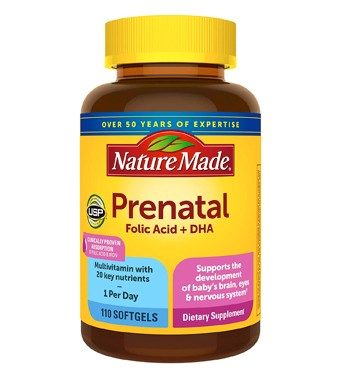
Pros
- Provides the recommended amount of DHA
- Very reasonably priced
- Third-party tested
Cons
- Not vegan friendly
- Lacks adequate calcium
Our Take
Nature Made’s prenatal multivitamin with DHA is a high-quality, budget-friendly option that provides DHA along with many other essential nutrients.
However, the product is not vegan-friendly and lacks the recommended amount of calcium.
Nature Made’s prenatal multivitamin with DHA is an excellent budget-friendly option. The product provides the total recommended amount of DHA in addition to 19 other nutrients (A, C, D3, E, and all 8 B vitamins) to support your health and the health of your baby.
Nature Made’s prenatal contains no artificial flavors, is gluten-free, and is third-party tested.
Their product is not suitable for vegans as it contains gelatin.
Additionally, Nature Made only provides 150 mg of calcium. The recommended dosage of calcium in a prenatal vitamin is 1,000 mg.
If you’re not getting adequate amounts of calcium in your diet, you may need a prenatal that has more of this vital mineral.
Price: $16.12 for a 110-day supply ($0.15 per day) on Amazon.
Things to Consider When Shopping for a Prenatal Vitamin
The following are factors to consider when choosing the best prenatal vitamin for yourself:
Form
Prenatal vitamins come in various forms, and you’ll find pills, capsules, and gummies to choose from.
For many women, the best prenatal vitamin choice boils down to which one they can tolerate the best.
If the thought of swallowing a large pill makes you queasy, then perhaps taking a prenatal gummy may be the best choice.
Cost
The most expensive prenatal vitamin isn’t necessarily the best. Looking closely at the ingredients will give you an idea of the quality of the product.
Additionally, your insurance may be more likely to pay for your vitamins if you have a prescription.
If you have a health savings account, you can generally use that money to pay for your prenatal vitamins as well.
Third-Party Testing
Third-party testing for supplements is a way to help ensure the purity, potency, and quality of a product.
Some common third-party testing seals you may find on the packaging may include Consumer Labs, US Pharmacopeia (USP), and NSF International.
Ingredients
A prenatal vitamin will provide a variety of essential nutrients. The basics should include folic acid, iron, calcium, and vitamin D. If you’re not eating fatty fish like salmon, you may want to consider a product that also contains DHA.
See “Important Ingredients to Look For in a Prenatal Vitamin” below for more information.
Tolerance
Many women experience morning sickness along with other gastrointestinal distress during pregnancy. A prenatal vitamin can exacerbate these issues.
Finding a prenatal vitamin that you can tolerate may take some trial and error but finding the best one can make a world of difference in how you feel.
Important Ingredients to Look For in a Prenatal Vitamin
The American College of Obstetricians and Gynecologists (ACOG) recommends prenatal vitamins with the following nutrition profile: (3)
- Folic acid: 600 mcg
- DHA: 200 mg
- Iron: 27 mg
- Calcium: 1,000 mg
- Vitamin D: 600 IU
Folic Acid
One of the most important nutrients to look for in a prenatal vitamin is folic acid.
Folic acid is an essential nutrient to consider even before you conceive because taking folic acid before conception can help prevent birth defects of the brain and spinal cord, also known as neural tube defects.
It is recommended that all women of childbearing age get 400 micrograms of folic acid daily. If pregnant, that need increases to 600 micrograms daily.
DHA
Docosahexaenoic acid, or DHA, is one of the three essential omega-3 fatty acids found primarily in seafood.
During pregnancy, DHA is crucial for your baby’s brain development.
While a reference intake for the amount of DHA that should be consumed per day hasn’t been established yet, many health care providers believe that pregnant and lactating women should consume at least 200 milligrams of DHA per day.
Iron
Another vital nutrient to look for in your prenatal vitamin is iron. You’ll need twice as much iron to support your health and the health of your growing baby.
Look for a prenatal vitamin with 27 milligrams of iron.
Calcium
Your baby will require calcium for the development of their bones, teeth, muscles, and nerves.
What your baby doesn’t get through your diet, they will take from your bones. This can lead to a higher risk of osteoporosis later in life.
Getting 1,000 milligrams of calcium from your prenatal supplement will prevent bone loss and support your baby’s healthy growth and development.
Vitamin D
Vitamin D works hand-in-hand with calcium to support your baby’s bones, teeth, skin, and eye development. Your prenatal vitamin should provide 600 IU (international units) of vitamin D.
If you or your healthcare provider suspects that you might be deficient in vitamin D, they may recommend increasing your intake to 800 or 1,000 IU daily.
Additional Vitamins and Minerals
Other vitamins and minerals found in different types of prenatal vitamins may also include:
Iodine
Iodine will help your body produce thyroid hormones, which will support your baby’s brain development.
Unfortunately, mild iodine deficiency is common among pregnant women, and iodine deficiencies have been linked to irregularities in brain development and complications during delivery.
Therefore, the American Academy of Pediatrics (AAP) recommends taking a prenatal vitamin that contains at least 150 mcg of iodine. (4)
Vitamin C
During pregnancy, your blood volume increases dramatically. This is a time when your body needs to absorb as much iron as possible. As an iron absorption promoter, vitamin C helps make this possible.
Zinc
Your baby needs zinc for healthy cell growth and brain development. This essential mineral also helps support your immune system, which can be vital during cold and flu season.
While deficiencies are rare, some studies link zinc deficiency to low birth weight and other problems during pregnancy. (5)
Choline
Choline is an essential nutrient that supports the healthy development of your baby’s brain and spinal cord. Much like folic acid, choline can also protect babies against neural tube defects.
Eggs, meat, fish, and some whole-grain cereals are good sources of choline. If you’re eating a well-balanced diet, you may be able to get enough of this important nutrient through diet alone.
If not, ask your healthcare provider about whether a prenatal vitamin that includes choline may be best for you.
Frequently Asked Questions About Prenatal Vitamins
Why should I take a prenatal vitamin?
Prenatal vitamins fill in the nutrition gaps in your diet to help support your baby’s growth and sustain your pregnancy.
One of the most important and well-researched nutrients found in prenatal vitamins is folic acid.
A folic acid deficiency has been linked with anemia in mothers and congenital disabilities, namely neural tube defects in infants.
Dietary supplementation with folic acid around the time of conception has been known to reduce the risk of neural tube defects in babies.
Prenatal vitamins also provide an array of essential nutrients, including iron, calcium, vitamin D, DHA, and iodine, among others.
These nutrients support your baby’s healthy growth and development and ensure your body also has what it needs.
When should I start taking prenatal vitamins?
Ideally, it would be best if you began taking a prenatal vitamin before conception. Taking a prenatal vitamin before conception will ensure that you have an adequate amount of folic acid to prevent congenital disabilities.
Will I experience any side effects with taking a prenatal multivitamin?
You may feel slightly nauseous after taking a prenatal vitamin. If this is the case, ensure you take it with a meal.
Additionally, some women may experience constipation as a result of the iron found in their supplements. If you’re experiencing constipation, try drinking more fluids and eating more high-fiber foods like fresh fruits, fresh vegetables, and whole grains.
If your constipation is persistent, talk to your health care provider about switching to a prenatal vitamin that doesn’t contain iron.
I’m struggling with morning sickness and can’t take my prenatal vitamin. What should I do?
If taking your prenatal vitamin with food doesn’t help alleviate your nausea, try taking it at bedtime.
You may also consider trying a different prenatal vitamin or taking half a dose in the morning and the other half in the evening.
If your nausea is persistent, speak with your health care provider to find the best solution to meet your individual needs.
How can I tell if a prenatal vitamin is trustworthy since they’re not regulated by the FDA?
Look for a third-party testing seal. These will include either the U.S. Pharmacopeia, NSF International, or ConsumerLab.com.
Seeing this seal means the facility has been cross-checked for proper manufacturing, the product has an accurate ingredient list, and it has been verified to have no toxins or harmful ingredients.
How many prenatal vitamins should I take each day?
Take only one serving of your prenatal supplement every day. Read the bottle to see how many pills make up one daily serving.
If your health care provider thinks you may need an additional supplement, they may recommend you take one in addition to your broad-spectrum multivitamin.
Are prescription prenatal vitamins better than over-the-counter ones?
Some may believe that prescription prenatal vitamins are higher in quality. However, this is not the case, as many prescription prenatal vitamins have a similar nutritional profile to over-the-counter ones.
One potential benefit of having a prescription for prenatal vitamins is that your insurance may cover some, if not all, of the cost.
It is always best to speak with your health care provider about which vitamins and supplements will best meet your individual needs.
What is the difference between a prenatal vitamin and a regular multivitamin?
One of the main differences between a prenatal multivitamin and a regular multivitamin is the amount of folic acid they provide.
It is recommended that pregnant women take 600 micrograms of folic acid per day. While some regular multivitamins may provide folic acid, only prenatal vitamins will provide the ideal amount to prevent neural tube defects. (6)
The Bottom Line
Taking prenatal vitamins is one of the best ways to ensure you have the nutrients you need to support the healthy development of your baby.
They generally contain all of the essential nutrients that can benefit you and your baby during this critical time.
There is no shortage of prenatal vitamin brands on the market to choose from, and while all of the choices can be overwhelming, look for one with 600 to 800 micrograms of folic acid and at least 18 milligrams of iron.
If your prenatal supplement doesn’t contain DHA, your health care provider may recommend a separate DHA supplement.
Choosing the best prenatal vitamin may be a matter of trial and error as you may tolerate some better than others.
Before taking any supplement, it’s always best to speak with your healthcare provider to make sure it will meet your individual needs.
A Few Additional Tips for You
- Try not to take your prenatal vitamin on an empty stomach. This can worsen nausea and vomiting.
- Vitamins can vary in size, smell, and taste. You may find that a particular brand might go down easier than another, so trying different ones is wise.
- One vitamin that you don’t want too much of is vitamin A. High levels of vitamin A have been linked to congenital disabilities. (7) Therefore, it’s important to avoid supplements with more than 100% of the recommended dietary allowance of vitamin A.
- After you deliver, you may consider continuing your prenatal vitamins for the duration of breastfeeding or longer to support your nutritional needs. It is best to speak with your healthcare provider about continuing your prenatal vitamin or any supplement to ensure its safety for you.
At WellnessVerge, we only use reputable sources, including peer-reviewed medical journals and well-respected academic institutions.
- Folic Acid Supplementation and Pregnancy: More Than Just Neural Tube Defect Prevention:
https://www.ncbi.nlm.nih.gov/pmc/articles/PMC3218540/ - Nausea and vomiting in early pregnancy:
https://pubmed.ncbi.nlm.nih.gov/24646807/ - American College of Obstetricians and Gynecologists: Nutrition During Pregnancy:
https://www.acog.org/womens-health/faqs/nutrition-during-pregnancy - American Academy of Pediatrics: AAP Recommendations on Iodine Nutrition During Pregnancy and Lactation:
https://pediatrics.aappublications.org/content/134/4/e1282.1 - Maternal zinc deficiency during pregnancy elevates the risks of fetal growth restriction: a population-based birth cohort study:
https://www.ncbi.nlm.nih.gov/pmc/articles/PMC4459238/#:~:text=Zinc%2520(Zn)%2520is%2520a%2520structural,%252C9%252C10%252C11. - Nutrition During Pregnancy:
https://www.acog.org/womens-health/faqs/nutrition-during-pregnancy?utm_source=redirect&utm_medium=web&utm_campaign=int - Vitamin A and Pregnancy: A Narrative Review:
https://www.ncbi.nlm.nih.gov/pmc/articles/PMC6470929/

